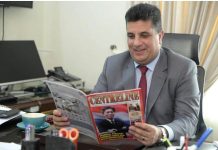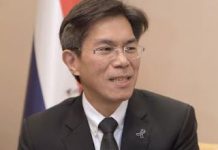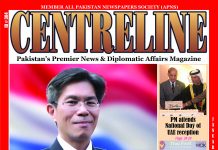Ambassador of Poland talks to Centreline and DNA
Ansar Mahmood Bhatti
Ambassador of Poland Mr. Piotr Opalinski talked exclusive to Centreline and DNA news agency. Mr Piotr Opaliński has been fascinated by the Orient, its culture, history, and present-day for over forty years. He has spent a quarter of a century in Central and Southern Asia – from attending university to experiencing the charm and challenges of everyday life. After completing his M.A. in Oriental philology at Tashkent State University, he gained experience in diplomacy and public administration in Warsaw, at the Polish Institute of Foreign Affairs and the National School of Public Administration, and in the Hague at the Clingendael Institute of International Relations.
He was awarded the Golden Cross of Merit for his achievements in diplomatic service and contribution to the development of relations between Poland and countries in South Asia, Africa, and the Middle East. His goals as the Polish ambassador to Pakistan include promoting cooperation between both countries in all areas – the economy, trade, politics, culture, and education.
In his spare time Mr. Opaliński enjoys listening to fusion music, in which the East combines with the West, and reading Urdu poetry by the likes of Mirza Ghalib, Mir Taqi Mir and Allama Muhammad Iqbal. He is an avid photographer and an amateur tennis player. He speaks English, Russian, Hindi, and Urdu. Here is the detailed interview.
- Let us begin with bilateral relations which in fact started soon after the independence of Pakistan when Polish pilots were asked to build Pakistan Air Force. If you could tell us something more?
In 1948 Prime Minister Liaquat Ali Khan sanctioned an agreement with exiled members of the Polish Air Force in the UK to build newly established Pakistani Air Force. Experienced pilots and engineers, who tested their skill and courage during the II World War, decided not only to work for Pakistani military, but to make Pakistan their new home. One of the most prominent Polish officers was Air Commodore Władysław Turowicz who apart from training pilots, was also one of the main creators of Pakistani missile project. For safeguarding Pakistan’s airspace for over 30 years he was later awarded with many respectable awards like Sitara-e-Pakistan, Sitara-i-Khidmat and others. In the PAF Museum Air Commodore Władysław Turowicz and thirty Polish pilots were commemorated. Most prominent memorial of historical Polish presence in Pakistan is the obelisk at Gora Qabristan Memorial in Karachi, commemorating Poles who lived there and contributed to the development of Pakistan. Recently I also discovered Polish graves in Rawalpindi, one of the belonging also to a pilot Władysław Banach. As you can see the Polish cooperation from the past is still visible, due to some recent discoveries and press articles even more than before.
- Poland is a gateway to Central and Eastern Europe and it is a market with huge potential. Do you think, Pakistani business people are making maximum use of this market?
I’m sure there is still plenty of space to increase the Pakistani presence on Polish market and vice versa. When it comes to economic cooperation our goal is to foster contacts between business in order to increase the trade exchange volume. Poland is a market with huge potential, not yet explored enough by Pakistani business, which tends to focus mainly on the EU Countries. Poland offers an interesting alternative, having less competition and at the same time offering an easy access to the rest of European markets.
- Poland is considered the best CEE country for business. What makes Poland so attractive for investors?
Certainly Poland is the biggest market among the CEE countries which gives its strong leverage when it comes to overall purchase power of customers. The workforce is highly motivated, skilled and often cheaper when compared to other countries. At the same time, economy of Poland is still robust and steered away from recession which was affecting some other countries. Also, the cost of living, including the rents, may seem more attractive which can add to overall cheaper cost of running the business.
- People to people relations hold equal importance in terms of improvement in bilateral relations. How can we further strengthen these relations?
It is important for the people of both countries to have a better knowledge of each other’s culture, customs and beliefs. That improves bilateral relations by making and individual better understand potential business or political partners in the future agreements and ventures. This better understanding can result in closer ties and cooperation between two countries. In order to achieve this goal we will continue to organize events during which we will present Polish culture to Pakistani audience, like a jugalbandi of Polish and Pakistani musicians. We would also like to introduce some of the polish literature translated into Urdu to local readers.
- Various Polish companies are engaged in Pakistan. Can you share some details about these companies and their scope of work? In addition, how did these companies find the business climate of Pakistan?
One of the biggest Polish companies in Pakistan is Polish Oil and Gas Company, actually the biggest Polish Company operating on Pakistani market. Being one of the first to arrive in Pakistan, it is still doing very well and is planning to increase its operations. Their profile of business suits current needs of Pakistan market very well, and I’m sure it will help, or even is helping already to alleviate energy crisis. There is also increasing number of companies from FMCG sector, selling for instance cosmetics or OTC drugs, which quality is on par with products of Western countries at a lower cost. The business climate of doing business in Pakistan as seen by the companies which are already present on the market seems to be much more favorable then presented in world media. The great asset of Pakistan are not only natural resources, but also skillful workforce and growing consumer market. Nevertheless, security situation, uncertainty of law and energy crisis still puts off many companies even before entering the market. The lack of mutual agreement on judiciary help combined with a red tape is not helping the companies take a decision to involve in Pak. Market. Our job is to give the companies clear and relevant picture of the country. Most companies will underline the friendly attitude of the common Pakistani people.
- Since you have served here before so you understand the region quite well. What in your view is necessary to ensure stability in the region with particular reference to Pakistan, India and Pakistan-Afghanistan relations?
Without cooperation, or at least cessation of hostilities and resumption of peaceful talks the long-lasting stability in the region cannot be achieved.
Along with all members of the European Union Poland does support the shared EU position on the need of a peaceful, political settlement of the situation in Kashmir, and – as one can see from the consecutive resolutions passed by European Parliament, the EU appeals to the parties involved to come to a negotiated solution of this issue.
Poland has also – for more than a decade, supported reconstruction of Afghanistan through its development assistance instruments and political support for the Afghan government, and in a recent Conference on Afghanistan in Brussels on October 5, Poland pledged to extend its contribution to the year 2020. The basic condition to build a democratic and stable Afghan state remains, however, to ensure peace and security.
- How do see evolution of democracy in Pakistan. People somehow seem unhappy with the democratic system in vogue. What is your assessment of the situation?
There is a famous quote on democracy which originated in one of Winston Churchill speeches; “No one pretends that democracy is perfect or all-wise. Indeed, it has been said that democracy is the worst form of Government except all those other forms that have been tried from time to time.” In other words, democracy may have its liabilities that cannot be easily maintained, or might be inherited part of the system’s design. That is for instance a tendency of leaders to undertake only those actions which let them win next elections, and not necessarily those which are not popular in society, yet may be necessary and beneficial in future, like difficult, long-term reforms leading to modernization of the country. While authoritarian government may often appear to be a resolution for idleness of democratic government and it’s corruption, one need to remember that it is not democracy that’s corrupting the leaders, but more likely the power itself. Hence it’s better to turn onto education, political activity and building civil society in order to positively affect the democracy instead of denying it as such.
- Pakistan since long is fighting war on terror. How do you see Pakistan’s role and role of armed forces in this war?
In my opinion security situation has improved a lot since the start of Zarb-e-Azb operation and the sacrifices bring the positive results. The top political and military leaders are on the same page about existential threat to Pakistan, pointing at extremism as a main source of unrest not only in Pakistan, but in the whole region. This issue needs to be resolved by the continuous and unified effort of all stakeholders. Religious minorities, Christians and others, are an indelible part of the fabric of Pakistani society – they are symbolically represented by the white stripe on the Pakistani flag.
- Your impression about Pakistan and people of Pakistan?
This is the second time I have the privilege of working in Pakistan. My previous tenure as deputy head of the Mission between 1999 and 2005 gave me an opportunity to learn about the fascinating culture, history, and present-day of Pakistan. Now, after about ten years, I have the honour, privilege and real pleasure to serve as Ambassador of Poland in Islamabad, my second home and a unique capital city with its beautiful view of Margalla Hills and lush greenery. I am still enchanted by Pakistan, its abundant culture, music, poetry and diverse cuisine. While we do see a remarkable development of country’s economy and infrastructure, the real treasure of Pakistan is its warm, hardworking, friendly and welcoming people. Both our countries and peoples share common values, like the appreciation of a family and respect for tradition. I am sure our friendship and multifaceted cooperation will grow in the years to come to the benefit of our countries and people.











